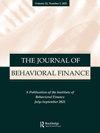情绪机制和股市对常规和非常规货币政策的反应:来自经合组织国家的证据
IF 1.7
3区 经济学
Q3 BUSINESS, FINANCE
引用次数: 8
摘要
摘要本文研究了传统和非常规货币政策冲击对加拿大、法国、德国、日本、意大利、西班牙、英国和美国八个发达经济体股票市场的影响。在这方面,我们对2007年1月至2020年7月期间的月度数据(产量、价格、股票价格、货币政策指标以及消费者和企业情绪)使用面板向量自回归(VAR),通过使用零和符号限制来识别货币政策冲击。我们发现强有力的证据表明,与低投资者情绪机制相比,在整体面板和个别国家(具有一定程度的异质性)相对较高的乐观情绪相关的状态下,股票价格对扩张性货币政策冲击的反应更强。我们的研究结果对学者、投资者和政策制定者具有重要意义。本文章由计算机程序翻译,如有差异,请以英文原文为准。
Sentiment Regimes and Reaction of Stock Markets to Conventional and Unconventional Monetary Policies: Evidence from OECD Countries
Abstract In this paper, we investigate how conventional and unconventional monetary policy shocks affect the stock market of eight advanced economies, namely, Canada, France, Germany, Japan, Italy, Spain, the U.K., and the U.S., conditional on the state of sentiment. In this regard, we use a panel vector auto-regression (VAR) with monthly data (on output, prices, equity prices, metrics of monetary policies, and consumer and business sentiments) over the period of January 2007 till July 2020, with the monetary policy shock identified through the use of both zero and sign restrictions. We find robust evidence that, compared to the low investor sentiment regime, the reaction of stock prices to expansionary monetary policy shocks is stronger in the state associated with relatively higher optimism, both for the overall panel and the individual countries (with some degree of heterogeneity). Our findings have important implications for academicians, investors, and policymakers.
求助全文
通过发布文献求助,成功后即可免费获取论文全文。
去求助
来源期刊

Journal of Behavioral Finance
Multiple-
CiteScore
4.60
自引率
10.50%
发文量
34
期刊介绍:
In Journal of Behavioral Finance , leaders in many fields are brought together to address the implications of current work on individual and group emotion, cognition, and action for the behavior of investment markets. They include specialists in personality, social, and clinical psychology; psychiatry; organizational behavior; accounting; marketing; sociology; anthropology; behavioral economics; finance; and the multidisciplinary study of judgment and decision making. The journal will foster debate among groups who have keen insights into the behavioral patterns of markets but have not historically published in the more traditional financial and economic journals. Further, it will stimulate new interdisciplinary research and theory that will build a body of knowledge about the psychological influences on investment market fluctuations. The most obvious benefit will be a new understanding of investment markets that can greatly improve investment decision making. Another benefit will be the opportunity for behavioral scientists to expand the scope of their studies via the use of the enormous databases that document behavior in investment markets.
 求助内容:
求助内容: 应助结果提醒方式:
应助结果提醒方式:


